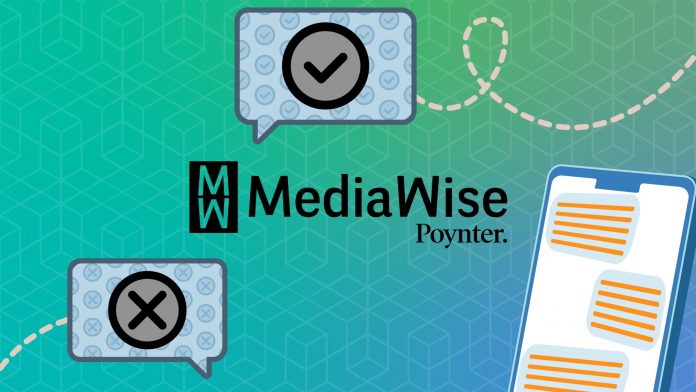ST. PETERSBURG, Fla. (July 12, 2022) – With less than four months until the U.S. midterms, the social-first digital media literacy initiative MediaWise at the nonprofit Poynter Institute has launched Find Facts Fast, a free multimedia messaging service that teaches voters how to quickly discover reliable and trustworthy information online.
The text message course is designed to empower everyone with the skills to more fully participate in the democratic process and spot misinformation on the internet and social media.
“Elections make fertile grounds for bad actors — domestic and abroad — to plant seeds of disinformation, due in part to polarization, heightened emotions and a 24/7 news cycle on social feeds,” said Alex Mahadevan, director of MediaWise. “Find Facts Fast helps anyone — our neighbors, family members and friends — wade through the flood of misinformation we’ll see in the coming months and beyond.”
Anyone can sign up for this weeklong course and receive daily lessons via text message or WhatsApp.
Digital media literacy experts will teach participants how to verify online content, identify manipulated videos and images, diversify their news diets, and avoid echo chambers.
MediaWise Ambassadors Joan Lunden, journalist, best-selling author and television host; Amna Nawaz, chief correspondent at PBS NewsHour; Hari Sreenivasan, anchor of PBS NewsHour Weekend and Amanpour and Company contributor; and Dave Jorgenson, senior video report and “TikTok guy” at The Washington Post, will also share some of the fact-checking best practices they picked up throughout their rich careers as award-winning journalists. Fact-checking specialists from PolitiFact and MediaWise’s Teen Fact-Checking Network will also guide users through the verification tools and techniques they use in their day-to-day work.
At the end of the course, participants will be able to detect misleading and false information on the internet and learn how to talk to friends or family who share misinformation online.
“Digital media literacy education is just one of the ways each of us can do our part to stop misinformation in its tracks,” said Vanya Tsvetkova, interactive learning designer for MediaWise. “This text-based service is an introductory crash course that helps people of all ages and backgrounds build the fundamental skills they need to be their own fact-checker on and off the internet.”
While the course is for everyone who wants to improve their digital savviness and contribute to a healthy democracy, the lessons are especially beneficial for marginalized groups who are often targets of disinformation campaigns and media manipulation including Asian Americans and Pacific Islanders, Black Americans, Latin Americans, and older adults.
Sign up for free today. Visit the program page for more information.
Media Contact
Tina Dyakon
Director of Marketing
The Poynter Institute
[email protected]
727-553-4343
About The Poynter Institute
The Poynter Institute for Media Studies is a global leader in journalism education and a strategy center that stands for uncompromising excellence in journalism, media, and 21st-century public discourse. Poynter faculty teach seminars and workshops at the Institute in St. Petersburg, Florida, and at newsrooms, conferences, and organizations around the world. Its e-learning division, News University, offers the world’s largest online journalism curriculum, with hundreds of interactive courses and tens of thousands of registered international users. The Institute’s website produces 24-hour coverage about media, ethics, technology, and the business of news. Poynter is the home of the Craig Newmark Center for Ethics and Leadership, the Pulitzer Prize-winning PolitiFact, the International Fact-Checking Network and MediaWise, a digital information literacy project for young people, first-time voters, and senior citizens. The world’s top journalists and media innovators rely on Poynter to learn and teach new generations of reporters, storytellers, media inventors, designers, visual journalists, documentarians, and broadcasters. This work builds public awareness about journalism, media, the U.S. First Amendment, and discourse that serves democracy and the public good. Learn more at poynter.org.
About MediaWise
MediaWise is a social-first digital media literacy initiative of the nonprofit Poynter Institute. The program teaches people of all ages and backgrounds how to responsibly engage with online content in the age of information overload. The fact-checking enterprise was created in 2018 to empower citizens to find trusted sources and make sense of the vast amount of information at their fingertips. We bring simple, yet effective, digital media literacy tools to people where they are — whether they’re on Facebook, Instagram, YouTube, Twitter or TikTok or in one of the five countries where MediaWise operates — and walk them through every step to determine what’s real and what’s not on the internet. Through MediaWise, everyone can do their part to reduce the spread of misinformation and elevate the truth. Follow MediaWise on social media to learn how to debunk viral claims and be more critical consumers of online information. Explore programs and be part of the solution at poynter.org/mediawise.
Paywalls bolster news organizations’ bottom lines, but leave Americans in the dark. As a public service, let everyone read election stories for free.
Plus, why you should get another booster shot now, lines are growing at food banks, Canadians restart random testing for travelers, and more.
Customs and Border Protection released its findings on an investigation after images went viral of horse-mounted agents pursuing Haitian migrants.
Clines leaves behind a legacy of sharp and graceful writing, arguably unmatched in its range, energy and creativity.
‘It’s not something you can take back. I wanted to be mindful and careful.’
You must be logged in to post a comment.
This site uses Akismet to reduce spam. Learn how your comment data is processed.
Get the Poynter newsletter that’s right for you.
Support responsible news and fact-based information today!






